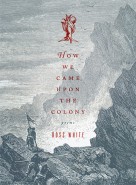
Book Review: How We Came Upon the Colony by Ross White

How We Came Upon the Colony
Poems by Ross White
Unicorn Press, October 2014
ISBN-13: 978-0877759317
$10.00; 24 pp.
Reviewed by Alyse Bensel
The contemporary world becomes a lost and strange colony among the mire of Ross White’s chapbook How We Came Upon the Colony. In less than twenty poems, White has built a world immersed in narrative detail and compelling characters by uprooting the language of colonization for very different ends. Rather than conquer, these poems disseminate experience through the character’s very actions that fill the book. In the title poem’s open acknowledgement, this we, after being shipwrecked on the new colony, “shared / visions: a celestial body / a burning hand, in stars.” They find the colony, already built, inhabited only by “books, bound in hides / we did not recognize, lay waiting, their pages blank.” It is in this act of creation that sets up the remainder of the chapbook, where physical existence is as much an act of writing as it is moving through the world.
Some poems explicitly address life in the colony. In “Upon Establishing the Colony, We Likened it to Paradise,” a familiar phrase that incants the language of colonial America, the colonists find an array of wealth in the earth. Shifting away from likening this new world to Eden, the colonists find the description in Genesis inadequate and decide to employ their own language. But banishment is what happens in this re-appropriation:
I write today to ask you to burn the vellum.
I have laid torch to the libraries we built.
The description of paradise is a trifle
before the inexorable description
of our expulsion from it.
A failure of language has occurred. The gaps between the act of writing and consumption and “the bloodshed, / the salt and lime spread on the soil” forces the reader to fill in the gaps between plenty and tragedy.
Amidst the discovery, building of, and banishment from this colony, the present awaits. In the longer poem “Box and Whisker Plot,” the speaker interrogates the meaning behind numbers and the experience (and end of) life itself. Initially relating how “I learned addition first, so thought / math was about birth” the speaker then divulges his loving of Lily, who collected generic baby photographs. “She had baby histories to tell all night / and none of them grew / out of those cheap, tidy frames,” the speaker notes. Among stifled creation looms inevitably, as the speaker confesses
I can’t seem to put dying, now,
at the right angle to living.
Why won’t my mind let go
of that bone?
Age continues to haunt the poem, hinting at the inevitable expulsion from the world.
The language of discovery collapses histories in this chapbook, providing an entry point into the possibilities of language. In particular, poetry here lends the capacity to speak of life’s unknowns, and the ravages it leaves upon those who continue forward.
Alyse Bensel is the author of the chapbooks Not of Their Own Making (Dancing Girl Press, 2014) and Shift (Plan B Press, 2012). Her poetry has most recently appeared or is forthcoming in Mid-American Review, Menacing Hedge, Heron Tree, and burntdistrict, among others. She serves as the Book Reviews Editor at The Los Angeles Review and Managing Editor of Beecher’s.

Leave a Reply